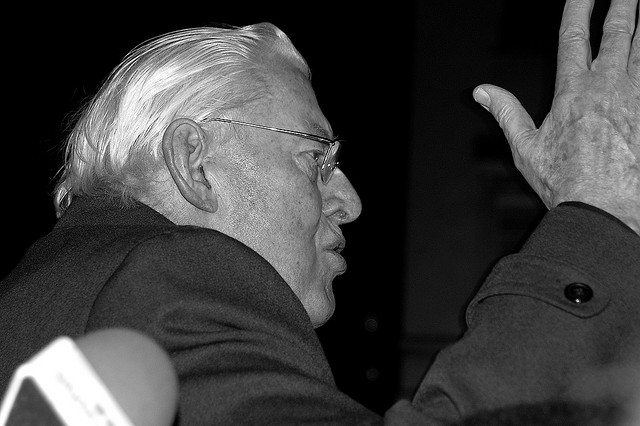"The legacy of Ian Paisley: 1926 – 2014"
October 6th, 2014 Ian Paisley was a lightning rod of controversy, but Jake Elson, 20, a Correspondent from Bunbury in Australia, says one legacy of Paisley’s fiery political career is a compromise that took a step toward peace.
Ian Paisley was a lightning rod of controversy, but Jake Elson, 20, a Correspondent from Bunbury in Australia, says one legacy of Paisley’s fiery political career is a compromise that took a step toward peace.
“And Death shall have no Dominion”. Though the Reverend Ian Paisley has passed, the memory of his life will live on both positively and negatively.
To Ulster Protestants he was a hero, fighting a series of battles to maintain majority rule and their right of the soil. To Irish Nationalists he was the devil incarnate, a bigoted fundamentalist doing his utmost to maintain a colonial hegemony in the north. As a preacher, he was uncompromising. Fiery and stubborn at the pulpit, he was unshakeable in his beliefs. He was even willing to go to prison rather than admit defeat. However, his legacy will be his role in politics and the eventual acceptance of compromise leading to a solidification of the peace process.
As an Australian Catholic with Anglo-Irish heritage, I found Ian Paisley a somewhat complex character at face value. As a preacher, he was a firebrand unwavering in his beliefs. He was a staunch anti-papist, who in 1958 accused the Queen Mother and Princess Margaret of committing adultery. When Pope John XXIII died in 1963, he declared ‘This Romish man of sin is now in Hell!’. His most famous incident was when, in the European Parliament, he denounced Pope John Paul II as the antichrist, leading to his ejection from that sitting. When the British Parliament began to decriminalise homosexuality in 1967, Paisley led the infamous ‘Save Ulster from Sodomy’, which effectively stopped decriminalisation in Northern Ireland until a European Court of Human Rights ruling in 1982. Even though the opinion of the world was against him, he would never back down.
Indeed, it was this fiery rhetoric coupled with his attitude of ‘No Surrender’ that played a major part of escalating the troubles. He was convicted and sentenced to six weeks imprisonment for lobbing snowballs at the visiting Taoiseach, Sean Lemass. An incident in 1964 where a nationalist election candidate flew the Irish Tricolour, prompting a police raid at the behest of a complaint by Paisley himself, led to rioting across Belfast. By that time passion and hatred reached tipping point. Irish Catholics were determined to have their say, culminating in the Northern Irish Civil Rights movement. Rather than try to put out the fire, he led his supporters into it. As a consequence, Paisley would be jailed several times for inciting riots between Catholics and Protestants. These continuing running battles led to the suspension of home rule in Northern Ireland and the presence of the British Army.
Even though he was still as firm as ever in his beliefs, Paisley somewhat mellowed with age. Originally refusing to co-operate in the Good Friday Agreement in protest to the participation of the nationalist Sinn Fein – whom Paisley suspected was the Political front of the IRA – he did make a step towards reconciliation, famously meeting in 2004 the Taoiseach Bertie Ahern at Leinster House. In 2006, in the St. Andrews Agreement, Paisley’s political party, the Democratic Ulster Party, and Sinn Fein, agreed to new elections. Despite earlier criticism of Sinn Fein that year, he agreed to a landmark power sharing agreement. Paisley himself was able to gain a major victory at the negotiation table, with Sinn Fein agreeing to recognise the Police Service of Northern Ireland. Paisley’s DUP won a landmark election, and he would become First Minister of Northern Ireland – a position he would only hold for little more than a year. However, there is some scepticism over his motives. A former DUP member claimed Paisley would only accept compromise if it left him in a position of power. Nevertheless, it was a major step forward toward peace.
Ian Paisley was without a doubt the archetype of a strong character. He was someone who, although he would create bitter enemies, would make some of the most loyal allies. His death is the end of an era. Perhaps as a result of his politics, Northern Ireland’s place in the union is more solidified today than it was 60 years ago. However, his passing has coincided with a period of uncertainty. With the DUP-Sinn Fein coalition still on shaky ground and the Scottish Independence debate threatening to re-open old wounds, Northern Ireland’s future is still on a knife’s edge. Yet come what may, perhaps the lessons of the past will lead Northern Ireland to a peaceful resolution, whatever her citizens chose is the right path.
photo credit: lewishamdreamer via photopin cc
…………………………………………………………………………………………………………………
About me:
I am a history buff, but also am into soccer. I referee soccer, and would like to go FIFA one day. I’m currently studying politics and international relations at Edith Cowan University. My aim is to become a police officer in Western Australia, and I would like to be Prime Minister one day.
I am a Conservative and a Monarchist, and believe in the role of the Commonwealth as a tool for good.
…………………………………………………………………………………………………………………
Opinions expressed in this article are those of the author and do not necessarily represent the views of the Commonwealth Youth Programme. Articles are published in a spirit of dialogue, respect and understanding. If you disagree, why not submit a response?
To learn more about becoming a Commonwealth Correspondent please visit: http://www.yourcommonwealth.org/submit-articles/commonwealthcorrespondents/
…………………………………………………………………………………………………………………




